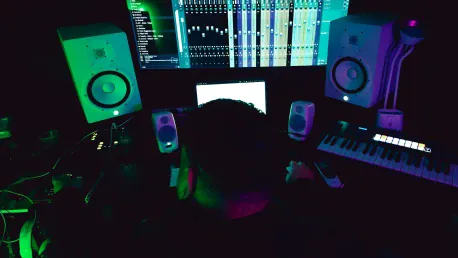The advent of artificial intelligence (AI) in the music industry has generated a wave of excitement and skepticism, pushing the boundaries of what’s possible in music creation. This transformative technology offers a range of innovative tools that not only assist in the technical aspects of music production but also act as creative collaborators, expanding the potential horizons for musicians. The integration of AI into music brings both promising possibilities and significant challenges, especially concerning the preservation of human ingenuity and ethical concerns around intellectual property.
AI’s Evolving Role in Music Creation
AI technology has revolutionized the music creation process by enabling machines to generate complete musical tracks and perform complex tasks like sound analysis, noise removal, mixing, and mastering. Tools such as Suno, Beatoven, AIVA, and Soundraw have broadened the possibilities for musicians, providing them with cutting-edge resources to enhance their creativity. These advancements seek to augment the musician’s toolkit, offering innovative solutions that can lead to the development of unique sounds and genres. Despite these technological strides, there is a continuous debate about AI’s impact on the authenticity and originality of music. Some individuals fear that the widespread use of AI might undermine the essential human element, leading to a homogenization of musical expression. Conversely, others view AI as a tool that supports and elevates the artist’s creative process rather than replacing it. By acting as a collaborator, AI can offer new perspectives and possibilities, pushing musicians to explore uncharted artistic territories.
Industry Skepticism and Ethical Concerns
The rapid advancement of AI in music has not come without its share of skeptics and ethical concerns. A significant source of anxiety is the potential devaluation of human musicians’ work. There are fears that AI could infringe on the ownership rights of original artists by mimicking their styles and sounds, leading to conflicts over royalties and recognition. This issue came to the forefront in April 2024, when the Artist Rights Alliance in the United States published a letter signed by over 200 artists. These artists called for developers to avoid training AI models using copyrighted content without proper authorization, stressing the importance of protecting the rights and creativity of musicians. This controversy underscores the need for ethical guidelines and regulations to ensure fair use of AI in music creation. It is crucial to navigate these complexities to foster an environment where both technological innovation and artistic originality can thrive.
AI as a Democratizing Force
Proponents of AI tools in music often highlight their potential to democratize the music creation process. By eliminating the need for expensive equipment and extensive training, AI makes it possible for aspiring musicians to produce and share their music more easily. This accessibility can empower a broader range of artists from different backgrounds, leading to a more diverse and inclusive music industry. However, this democratization is not without its concerns. While AI enables more individuals to create music, there are questions regarding the impact on the quality and originality of the produced work. Critics argue that the ease of creating music using AI could lead to an oversaturation of generic and formulaic tracks. Therefore, it is essential to balance accessibility with the preservation of the artistic integrity and innovative spirit that are the hallmarks of human music creation.
Human-AI Collaboration: A Composer’s Perspective
Alexis Weaver’s journey from AI skepticism to cautious advocacy provides a compelling case study of how AI can be integrated into the creative process. As a composer, Weaver initially harbored doubts about the role of AI in music. However, her collaboration with Sydney Opera House and Kopi Su on developing a generative music AI tool called Koup Music helped shift her perspective. Using the AI tool Riffusion, which converts text prompts into audio spectrograms, Weaver created unique sound samples that served as the foundation for her compositions. Weaver’s experiences illustrate the potential of AI as a creative partner rather than a replacement for human ingenuity. Through her work, she explored new artistic directions and experimented with sound in ways she might not have considered otherwise. The AI-generated samples provided Weaver with a platform to push the boundaries of her creativity, allowing her to incorporate unexpected and innovative elements into her music.
Creative Processes Enhanced by AI
The collaborative projects involving AI underscore its unique capabilities in enhancing the creative process. By leveraging AI, musicians can access a wealth of tools that facilitate experimentation without the constraints of traditional music production methods. AI’s ability to generate novel soundscapes and reimagine existing samples can inspire artists to think outside the box and venture into unexplored musical terrain. AI’s contribution to the creative process is not just about efficiency but also about expanding artistic possibilities. The imperfections and serendipitous outcomes produced by AI can lead to the creation of truly distinctive and original pieces. This collaborative dynamic between human creativity and AI technology ensures that the resulting musical compositions retain the artist’s personal touch while pushing the envelope of innovation.
Navigating the Future of AI in Music
The rise of artificial intelligence (AI) in the music industry has stirred a mix of excitement and skepticism, challenging the limits of what can be achieved in music creation. AI offers a variety of cutting-edge tools that not only help with the technical aspects of music production but also serve as creative partners. These advanced tools open up new possibilities for musicians, allowing them to explore soundscapes and compositions in ways not previously possible. However, the integration of AI into music creation also brings significant challenges, especially in maintaining the authenticity of human creativity and addressing ethical issues related to intellectual property rights. The balance between leveraging AI’s potential and preserving the essence of human artistry is a delicate one that the industry must navigate carefully, ensuring that technological advancements do not overshadow the irreplaceable value of human ingenuity in the realm of music.









